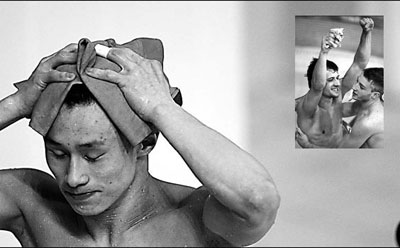Many foreign divers have been showing the highest levels of difficulty in their dives in recent competitions.
But Chinese diving officials insist they don't need to increase the degrees of difficulty to ensure their team's success and need only to improve the precision of their current dives.
 Chinese diver Zhou Luxin reacts after finishing second in the men's 10m platform at the16th FINA Diving World Cup in Beijing on February 24. Inset: German Sascha Klein celebrates with a teammate after beating Zhou to win the men's 10m platform gold medal. [China Daily]
Chinese diver Zhou Luxin reacts after finishing second in the men's 10m platform at the16th FINA Diving World Cup in Beijing on February 24. Inset: German Sascha Klein celebrates with a teammate after beating Zhou to win the men's 10m platform gold medal. [China Daily] |
"The Chinese team won't try to practice for higher difficulty degrees, but to strengthen the quality and stability of the dives," said Zhou Jihong, leader of China's national diving team.
"Some of the foreign divers are striving for highest difficulty levels. There will be no weak divers at the Olympic Games."
At the FINA Diving World Cup last month, the highest difficulty degree - and highest score - in the men's 3m springboard came from 21-year-old Yahel Castillo of Mexico, who was only 0.30 points behind China's world champion Qin Kai to take the bronze.
His 3.9 dive - the most difficult dive attempted up to that point - claimed the highest score of 105.30 and lifted him to third place.
His compatriot Paola Espinosa was the only one in the women's 10m platform to use two dives with the current highest difficulty level of 3.4. She claimed bronze at the event, after China's Chen Ruolin and Wang Xin.
In the men's 10m platform, which is considered a weak point of the Chinese team, Sascha Klein from Germany grabbed the gold with the highest total degree of difficulty. It was the only gold medal that China missed at the World Cup, which also served an important Olympic qualifier.
"At the semifinal of the men's 10m platform at the Grand Prix, one diver from the US even tried a dive with a difficulty degree of 4.1. Although he didn't quite pull it off, we can see that some of the foreign divers are planning to clinch the gold with high difficulty," Zhou said.
The top eight divers in the finals won qualification for the Beijing Games. Each national federation can submit its final list of divers before the June 23 deadline.
For the Chinese team, which is considered as the "diving dream team", the lineup for the Games won't be decided before then.
"The lineup of the World Cup is not the same one we'll send to the Beijing Olympic Games since our team will still attend many FINA competitions up until June," said team leader Zhou. "The lineup of the Beijing Olympic Games still needs some months to decide We will choose the best divers in their best form."
Of all the team members, "Diving Queen" Guo Jingjing has most likely booked her spot in women's springboard.
Her partner in the 3m synchronized event, Wu Minxia, who beat Guo in the individual event to win the title at the World Cup, has a great chance for another spot, although young diver He Zi emerged to win silver at the Grand Prix.
As for other Athens Olympic champions Hu Jia and Peng Bo, who were absent from the World Cup, Zhou said: "They had injuries in the past two years and took a rest for some time. Now they are still recovering. Whether or not they can enter the Olympics will be decided by their performances in the coming months."
Despite winning seven out of the eight gold medals at the World Cup and sweeping all the golds at the 14th FINA Diving Grand Prix last weekend in Shenzhen, Zhou said it was too early to get excited.
"There were still some world class divers who did not come," she said. "In the men's 3m springboard and 10m platform, Russia didn't send any divers. We just take it as a training session.
"Competing in two important events, one immediately after another, has required a lot of their physical and psychological conditions. How to adjust themselves to the best forms for different competitions should be what they have learned."